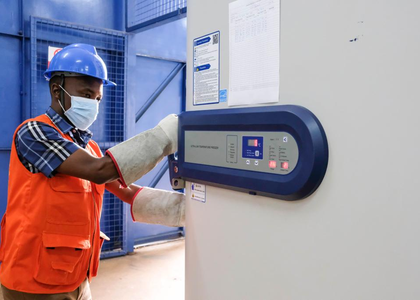Uganda declares end of Ebola outbreak
By IANS | Updated: April 27, 2025 15:17 IST2025-04-27T15:14:03+5:302025-04-27T15:17:25+5:30
Mbale (Uganda), April 27 Uganda has declared an end to the Ebola Sudan Virus Disease (SVD) outbreak after ...

Uganda declares end of Ebola outbreak
Mbale (Uganda), April 27 Uganda has declared an end to the Ebola Sudan Virus Disease (SVD) outbreak after completing a 42-day mandatory countdown without any new confirmed cases reported, less than three months after the virus was detected in the capital, Kampala.
Ugandan Minister of Health Ruth Aceng on Saturday made the announcement at Busamagga Primary School Playground in the eastern city of Mbale, one of the areas affected by Ebola, reports Xinhua news agency.
The World Health Organization (WHO) guidelines require that for a country to be declared Ebola-free, it must spend 42 days (two 21-day incubation cycles of the virus) without any new cases reported.
"Having completed two full incubation cycles -- that is, 42 days -- since the last confirmed case was discharged and having recorded no new cases amid sustained surveillance efforts, I now officially declare the current Sudan Ebola Virus Disease outbreak in Uganda to be over. Uganda is now free of active Ebola transmission," Aceng said.
Uganda declared the SVD outbreak on January 30 after a 32-year-old nurse died of the disease at the Mulago National Referral Hospital in Kampala.
During the outbreak, 14 cases, 12 confirmed through laboratory tests and two probable, were reported in the East African country. Four deaths, two confirmed and two probable, occurred, according to health authorities. A total of 10 people recovered from the infection, while 534 people were identified as contacts of the confirmed and probable cases and were closely monitored.
In a WHO statement, Chikwe Ihekweazu, acting WHO regional director for Africa, said Uganda's experience in managing outbreaks enabled a fast, coordinated and effective response to the virus.
"This outbreak challenged us in new ways. It touched both urban and rural communities across the country and unfolded against the backdrop of significant global funding constraints," Ihekweazu said.
"The response demonstrated Uganda's long-standing leadership in tackling public health emergencies. As the WHO, we are extremely proud to have supported these efforts every step of the way," he added.
According to the WHO, this outbreak was caused by the Sudan Ebola virus subtype, one of six species of the Ebola virus, which is a severe, often fatal illness affecting humans and other primates.
There are no approved treatments or vaccines for the Sudan strain of Ebola, but early initiation of supportive care has been shown to significantly reduce mortality, according to the WHO.
Despite the absence of licensed countermeasures against this species of Ebola, candidate vaccines are in various phases of clinical trials. Within four days of the government's declaration of the outbreak, the first-ever randomised clinical trial for vaccine safety and efficacy using the ring vaccination approach was launched.
The WHO donated 2,160 doses of the Ebola trial vaccine to Uganda to evaluate the efficacy of the vaccine in combating SVD, the eighth outbreak of the deadly disease in the country.
"Uganda's leadership and resilience were crucial in containing this outbreak," said Kasonde Mwinga, WHO representative in Uganda.
"From day one, the WHO worked hand-in-hand with the Ministry of Health, deploying expertise, providing essential supplies, and ensuring every suspected case was investigated. The people of Uganda have shown extraordinary resolve," she said.
The WHO said that although the outbreak in Uganda is over, the Ministry of Health, with continued support from the global health body and partners, will continue investing in surveillance, survivor care and preparedness to ensure Uganda remains safe.
Disclaimer: This post has been auto-published from an agency feed without any modifications to the text and has not been reviewed by an editor
Open in app